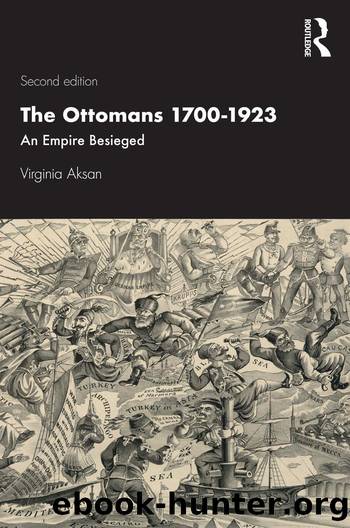The Ottomans 1700-1923 by Aksan Virginia;

Author:Aksan, Virginia; [Aksan, Virginia]
Language: eng
Format: epub
Tags: HISTORY/General, HISTORY/Middle East/Turkey & Ottoman Empire
Publisher: Taylor & Francis Group
Published: 2022-04-15T00:00:00+00:00
Notes
Charles Macfarlane, Constantinople in 1828: A Residence of Sixteen Months in the Turkish Capital and Provinces, with an Appendix to the Autumn of 1829 (2nd ed., Vols. 1 and 2) (London: Saunders and Otley, 1829), 500â5.
Howard Alexander Reed, âThe Destruction of the Janissaries by Mahmud II in June, 1826â (PhD diss., Princeton University, 1951). His work includes translations of the relevant sections of Mehmed Esad Efendi's, Ãss ül-Zafer.
Quoted in Avigdor Levy, âThe Military Policy of Sultan Mahmud II, 1808-39â (PhD diss., Harvard University, 1971), 404.
Helmut von Moltke, The Russians in Bulgaria and Rumelia in 1828 and 1829, During the Campaigns of the Danube, the Sieges of Brailow, Varna, Silistre, Shumla and the Passage of the Balkans, trans. Marshal Diebitch (London: John Murray, 1854), 13.
Hakan Erdem, ââDo Think of Them as Not Agricultural Labourers:â Ottoman Responses to the Greek War of Independence,â in Citizenship and the Nation-State in Greece and Turkey, eds. Thalia G. Dragonas and Faruk Birtek (London: Routledge, 2005), 67â85.
Macfarlane, Constantinople in 1828, 1, 59â60.
Moltke, The Russians, 58â59.
Moltke, The Russians, Appendix, 461â76. The habit of seasonal campaigning, and abandoning the battlefront in winter, a feature of Janissary history, may actually have inhibited such occurrences in former days.
Vernon John Puryear, France and the Levant: From Bourbon Restoration to the Peace of Kutiah (Berkeley: UC Press, 1941; reprint Archon Books, 1968), 85.
Andrew Robarts, âNowhere to Run, Nowhere to Hide? Society, State, Epidemic Diseases in the Early Nineteenth Century Ottoman Balkans,â in Plague and Contagion in the Islamic Mediterranean, ed. Nükhet Varlık (Kalamazoo; Bradford: ARC Humanities Press, 2017), 234.
Radu R. Florescu, The Struggle Against Russia in the Romanian Principalities: a Problem in Anglo-Turkish Diplomacy, 1821â54 (IaÅi: Center for Romanian Studies, 1997), 152.
Hakan Erdem, âRecruitment of the âVictorious Soldiers of Muhammadâ in the Arab Provinces, 1826â28,â in Histories of the Modern Middle East: New Directions, eds. Gershoni, Erdem and Woköck (Boulder, CO: Lynne Riener, 2002), 198â99. In fact, it is more than likely that many of the former Janissaries had been incorporated into the local forces of cities such as Damascus.
Charles Macfarlane, Turkey and its Destiny: The Results of Journeys Made in 1847 and 1848 to Examine into the State of that Country (Philadelphia: Lea & Blanchard, 1850), 327.
Reuben Safrastjan, âOttomanism in Turkey in the Epoch of Reforms in XIXc: Ideology and Policy I,â Ãtudes Balkaniques 24, no. 4 (1988): 75, footnote 7.
Helmuth von Moltke, Lettres de Maréchal de Moltke sur lâOrient (2nd ed.), trans. Alfred Marchand (Paris: Librarie Fischbacher, 1872), 111â12, 322.
Afaf Lutfi Marsot, Egypt in the Reign of Muhammad Ali (Cambridge: Cambridge University Press, 1984), 211.
L.S. Schilcher, Families in Politics: Damascene Factions and Estates of the Eighteenth and Nineteenth Centuries (Stuttgart: Steiner, 1985), 40â43.
Khalid Fahmy, All the Pashaâs Men: Mehmed Ali, His Army and the Making of Modern Egypt (Cambridge: Cambridge University Press, 1997), 247â48.
Roderic H. Davison, Reform in the Ottoman Empire 1856â76 (New York: Gordian Press, 1972), 31.
Muhammad H. KutluoÄlu, The Egyptian Question, 1831-41: The Expansionist Policy of Mehmed Ali PaÅa In Syria and Asia Minor and the Reaction of the Sublime Porte (Istanbul: Eren, 1998), 63â67.
Download
This site does not store any files on its server. We only index and link to content provided by other sites. Please contact the content providers to delete copyright contents if any and email us, we'll remove relevant links or contents immediately.
| Bahrain | Egypt |
| Iran | Iraq |
| Israel & Palestine | Jordan |
| Kuwait | Lebanon |
| Oman | Qatar |
| Saudi Arabia | Syria |
| Turkey | United Arab Emirates |
| Yemen |
Empire of the Sikhs by Patwant Singh(22176)
The Wind in My Hair by Masih Alinejad(4427)
The Templars by Dan Jones(4191)
Rise and Kill First by Ronen Bergman(4016)
The Rape of Nanking by Iris Chang(3518)
12 Strong by Doug Stanton(3059)
Blood and Sand by Alex Von Tunzelmann(2610)
The History of Jihad: From Muhammad to ISIS by Spencer Robert(2209)
Babylon's Ark by Lawrence Anthony(2073)
No Room for Small Dreams by Shimon Peres(1992)
The Turkish Psychedelic Explosion by Daniel Spicer(1990)
Gideon's Spies: The Secret History of the Mossad by Gordon Thomas(1952)
Inside the Middle East by Avi Melamed(1943)
The First Muslim The Story of Muhammad by Lesley Hazleton(1885)
Arabs by Eugene Rogan(1837)
Bus on Jaffa Road by Mike Kelly(1786)
Come, Tell Me How You Live by Mallowan Agatha Christie(1771)
Kabul 1841-42: Battle Story by Edmund Yorke(1650)
Citizen Strangers by Robinson Shira N.;(1536)
